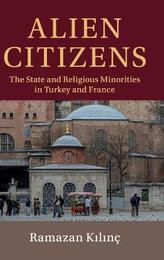
|
Alien Citizens: The State and Religious Minorities in Turkey and France
Hardback
Main Details
| Title |
Alien Citizens: The State and Religious Minorities in Turkey and France
|
| Authors and Contributors |
By (author) Ramazan Kilinc
|
| Series | Cambridge Studies in Social Theory, Religion and Politics |
|---|
| Physical Properties |
| Format:Hardback | | Pages:264 | | Dimensions(mm): Height 234,Width 157 |
|
| ISBN/Barcode |
9781108476942
|
| Classifications | Dewey:322.10944 |
|---|
| Audience | | Professional & Vocational | |
|---|
| Illustrations |
Worked examples or Exercises; 3 Tables, black and white; 2 Line drawings, black and white
|
|
Publishing Details |
| Publisher |
Cambridge University Press
|
| Imprint |
Cambridge University Press
|
| Publication Date |
10 October 2019 |
| Publication Country |
United Kingdom
|
Description
How does international context influence state policies toward religious minorities? Using parliamentary proceedings, court decisions, newspaper archives, and interviews, this book is the first systematic study that employs international context in the study of state policies toward religion, and that compares Turkey and France with regard to religious minorities. Comparing Christians in Turkey and Muslims in France, this book argues that policy change toward minorities becomes possible when strong domestic actors find a suitable international context that can help them execute their policy agendas. The Turkish Islamists used the European Union to transform the Turkish politics that brought a reformist moment for Christians in the 2000s. The Far Right in France utilized the rise of Islamophobia in Europe to adopt restrictive policies toward Muslims. Ramazan Kilinc argues that the presence of an international context that can favor particular groups over others, shifts the domestic balance of power, and makes some policies more likely to be implemented than others.
Author Biography
Ramazan Kilinc is Associate Professor of Political Science and Director of Islamic Studies Program at the University of Nebraska, Omaha. He has published articles in multiple journals including Comparative Politics, Political Science Quarterly, Politics and Religion, Turkish Studies, and Studies in Conflict and Terrorism. He is co-author of Generating Generosity in Catholicism and Islam: Beliefs, Institutions, and Public Goods Provision (Cambridge, 2018) and the editor of Siyasa: Forum on Islamic and Middle Eastern Politics.
Reviews'Through a comparative analysis of state policies toward Christian minorities in Turkey and Muslim minorities in France, Ramazan Kilinc effectively demonstrates how international norms and context can interact with domestic actors to shape state policies toward religious minorities. This is a notable work of research and scholarship. It is theoretically sophisticated and provides a new model to understand complex and often changing domestic state policies toward religious minorities.' J. Christopher Soper, Distinguished Professor of Political Science, Pepperdine University, California 'This timely and innovative book is a critical resource for anyone seeking to understand state policies towards religious minorities. Kilinc convincingly shows that domestic actors take advantage of changing international contexts to press for their preferred state policies towards religious minorities. The careful comparative analyses of French policies towards Muslims, and Turkish policies towards Christians, with extensions to additional cases, make this work essential reading in religion and politics. Alien Citizens is also a significant contribution to our understanding of the causal role of international factors in national politics.' Carolyn M. Warner, Vail Pittman Professor of Political Science and Chair of the Department of Political Science, University of Nevada, Reno 'In this empirically rich and theoretically ingenious book, Ramazan Kilinc brings the perspectives of International Relations in the analysis of state-religion relations. Alien Citizens examines state policies toward Christians in Turkey and Muslims in France by distinctively explaining how international conditions have shaped these policies.' Ahmet T. Kuru, author of Islam, Authoritarianism, and Underdevelopment: A Global and Historical Comparison 'What makes this book compelling and refreshing is its emphasis on the interaction between international and domestic policy arenas through an examination of seemingly opposing policies in two very different contexts.' H. Shambayati, Choice
|